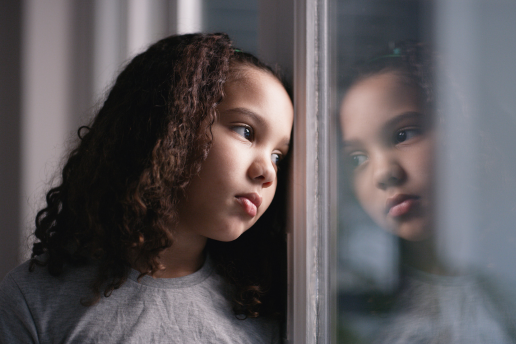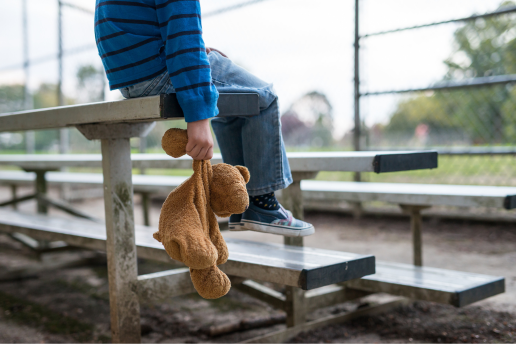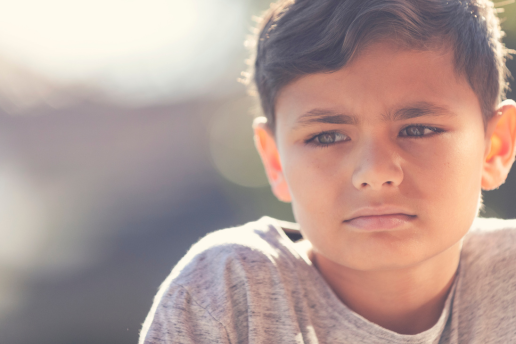When your family welcomes a new foster child or a relative child for kinship care, it’s critical to recognize that this child is experiencing grief and loss. Regardless of how valid and pressing the reasons were for removing the child from their home, this trauma can significantly impact the child, you, and the children already in your home. No matter how well-educated you are about foster or kinship care before the child’s arrival, facing their grief and loss once they are with you is a different story.
Eight Losses Foster & Kinship Kids Experience
 Most of us enter the foster system or agree to kinship care because we care deeply about children and want to help them heal. We agree to love and care for them for however long they are in our homes. Our goals also include supporting their families to heal, and along the way, we hope to prevent further loss for the children. The fact that they are in this position of needing care means that they have already sustained grief and loss.
Most of us enter the foster system or agree to kinship care because we care deeply about children and want to help them heal. We agree to love and care for them for however long they are in our homes. Our goals also include supporting their families to heal, and along the way, we hope to prevent further loss for the children. The fact that they are in this position of needing care means that they have already sustained grief and loss.
Trauma, grief, and loss can significantly impact a child’s development and behavior. Loss may also affect a child’s educational experiences and attachment skills for current and future relationships. How this child expresses his grief can also impact the relationships in your home and between you and the child’s family.
To help you understand the losses that foster and kinship kids experience, we are using the model of the losses explained in Katie Naftzger’s book Parenting In The Eye Of The Storm: The Adoptive Parent’s Guide to Navigating the Teen Years*.
1. Loss of continuity
 Foster and kinship kids sometimes miss the details that led to their removal. Often they don’t yet know the whole story of their early years. This lack of knowledge of their past can leave them feeling disconnected from their own story.
Foster and kinship kids sometimes miss the details that led to their removal. Often they don’t yet know the whole story of their early years. This lack of knowledge of their past can leave them feeling disconnected from their own story.
Once they join your home, they are part of a new family with another history they don’t know. Even if they are related to you, they don’t completely understand how you do things daily or the stories your family tells.
The lack of continuity in their own story and from theirs to yours is a loss. The impact of this loss can be felt more keenly during family holidays. The traditions you repeat, stories you tell, and everyday experiences you share can leave them unmoored. Their identity within your home feels unsecured.
2. Loss of safety
Many foster and kinship children have survived physically and emotionally unsafe situations. The loss of safety that they’ve experienced has a secondary impact. They’ve had to grapple – often at younger than developmentally typical – with the “what if’s” that come from feeling unsafe to cope with the loss of safety.
It would help if you acknowledged the lack of safety they felt and intentionally created an environment that communicates safety and security. Be a willing and present witness to their expressions of that loss, even if you were not part of the experience.
Surviving Childhood Trauma and Succeeding in Life: A Panel of Former Foster Youth
3. Loss of control
 Kids in the foster system or kinship care situation have previously experienced life at the whim of others. Those ” others ” often were addicted parents or caregivers with mental health. Those grown-ups’ decisions were out of this child’s control.
Kids in the foster system or kinship care situation have previously experienced life at the whim of others. Those ” others ” often were addicted parents or caregivers with mental health. Those grown-ups’ decisions were out of this child’s control.
Even now, though the child is safe in your home, much of their life is still at the mercy of others. How often have you heard (uninformed) folks say how “lucky” your foster child or grandchild is to have landed in your home? The loss of control over all those moments that led them to your home is tremendous, not lucky.
4. Loss of closure
Many of our foster and kinship kids are missing huge pieces of their lives. But they don’t even know what parts are missing… or where those pieces fit. The “not knowing” creates unresolved, unanswered dilemmas for the children. They struggle to predict outcomes. The loss of closure, coupled with the loss of control, can leave them feeling insecure and unattached, with a sense of loose ends untied.
In her book, Parenting In The Eye Of The Storm: The Adoptive Parent’s Guide to Navigating the Teen Years* Naftzger uses the metaphor of a 100-piece puzzle to illustrate this loss of closure. Our foster and kinship children feel like they have 99 pieces in place, but one part is missing forever.
5. Loss of trust in adults
 Children are supposed to be able to count on the adults in their lives. They develop their sense of self and understand the world around them when they can predict and rely upon the responses they get from their grown-ups.
Children are supposed to be able to count on the adults in their lives. They develop their sense of self and understand the world around them when they can predict and rely upon the responses they get from their grown-ups.
Kids who have experienced the trauma of leaving chaotic, unsafe first families don’t usually have the experience with trustworthy adults. Instead, the outcomes of trusting their parents were unhealthy, dangerous, or uncertain. Those frightening outcomes make it hard for our kids to trust adults again. Understanding the depth of that loss and re-building this child’s ability to trust you while they are in your home can be an uphill climb.
6. Loss of innocence
Foster and kinship kids don’t just lose their first home, parents, or sense of control or safety. The day their childhood stopped being safe and good, they also lost their innocence. Acknowledging that loss is a loving way to help them navigate the unknown territory ahead.
7. Loss of worth
 One of the core tasks of adolescence is the formation of identity. The tween and teen years are typically fraught with self-doubt and self-consciousness about appearance, abilities, and identities. However, when our foster or kinship kids join a family they don’t know, or that doesn’t look like them, it’s not uncommon for them to focus more on differences like race, physical features, and pre-existing relationships.
One of the core tasks of adolescence is the formation of identity. The tween and teen years are typically fraught with self-doubt and self-consciousness about appearance, abilities, and identities. However, when our foster or kinship kids join a family they don’t know, or that doesn’t look like them, it’s not uncommon for them to focus more on differences like race, physical features, and pre-existing relationships.
The experiences of unpredictability, abuse, or neglect that led them to us are yet another difference and may lead to more than age-typical loss of self-worth. These additional layers of struggle can lead to self-hatred, impacting the core of their developing identity. They despise their own features or racial and cultural norms. Instead, they develop a longing to look like the rest of their world, which deepens the loss of self-esteem and value.
8. Loss of accountability
Frequently the path our kids followed into and through the foster system has been unjust and unfair to the child. Delays in proper placements, communication between adults, and challenges in the continuity of care often never get resolved. The lack of accountability for these injustices and mishandling is a massive loss for our kids. Sadly, when their parents don’t comply with their recovery plans, there is also often a lack of accountability for the child.
Free Guide: Parenting a Child Exposed to Trauma
There is Good News
These losses can profoundly affect foster and kinship care children as they navigate toward adolescence and adulthood. The beauty of being a part of their lives is that these losses are not their whole story! Their stories can be full of potential and promise, as unique and evolving as each precious child. The privilege of foster or kinship care is that you can equip yourself to understand these losses and use what you learn to walk with the children toward healthy attachments, improved behavior, and healing. Even if they are only in your home briefly, your nurturing care will make a significant difference in this child’s future.
This post was originally published by Creating A Family on May 4, 2023. View the original post here.


